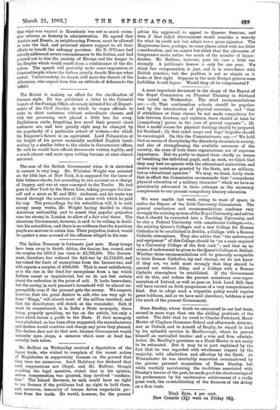The Indian Treasury is fortunate just now. Many troops have
been away in South Africa, the famine has ceased, and the surplus for 1902-3 has risen to £2,738,500. The Govern- ment, therefore, has reduced the Salt-tax by £1,113,300, and has raised the limit of exemptions from the Income-tax, and still expects a surplus of £948,000. That is most satisfactory, as is the rise in the limit for exemptions from a tax which Indians resent as inquisitorial, but we do not feel certain about the reduction in the price of salt. It looks benevolent, but the saving in each peasant's household will be almost im- perceptible even if the peasant gets the money. We suspect, however, that the great dealers in salt, who are very apt to form "Rings," will absorb most of the million remitted, and that the distributors will clutch at the remainder. Salt, it must be remembered, is in India a State monopoly, there being, properly speaking, no tax on the article, but only a price which leaves a profit to the State. If that monopoly were abolished, as has been often suggested, the manufacturers and dealers would combine and charge any price they pleased. The dealers dare not do that now, because Government would instantly open shops, a measure which once at least has actually been taken.










































 Previous page
Previous page